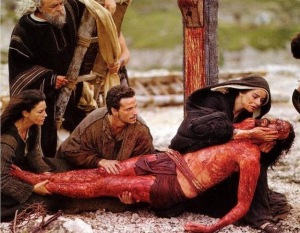Fred Laceda
Continue reading →They left that place and passed through Galilee. Jesus did not want anyone to know where they were, because he was teaching his disciples. He said to them, “The Son of Man is going to be delivered into the hands of men. They will kill him, and after three days he will rise.” But they did not understand what he meant and were afraid to ask him about it.
They came to Capernaum. When he was in the house, he asked them, “What were you arguing about on the road?” But they kept quiet because on the way they had argued about who was the greatest.
Sitting down, Jesus called the Twelve and said, “Anyone who wants to be first must be the very last, and the servant of all.”
He took a little child whom he placed among them. Taking the child in his arms, he said to them, “Whoever welcomes one of these little children in my name welcomes me; and whoever welcomes me does not welcome me but the one who sent me.”
Mark 9:30-37 NIV


 “Metho Andres, the police chaplain at Station 6 who prayed with the officers, told Reuters that the Bible justified the killing. Quoting Romans 13, he said Duterte was a God-appointed “agent of wrath” whom police should obey without question. He blamed drug users for their own deaths. “That’s a consequence of them disobeying,” said the pastor. “There is wrath coming for those who don’t obey.”
“Metho Andres, the police chaplain at Station 6 who prayed with the officers, told Reuters that the Bible justified the killing. Quoting Romans 13, he said Duterte was a God-appointed “agent of wrath” whom police should obey without question. He blamed drug users for their own deaths. “That’s a consequence of them disobeying,” said the pastor. “There is wrath coming for those who don’t obey.” He is from Galilee, the city located exactly at the other end of the political and economic center of Judea which is Jerusalem. From the time newspapers and prime time news programs beginning to cover his activities, spies and state agents were sent out to monitor his activities. Sifted from the reports of all four gospels, the power house of the elite and political class were dispatched to sleuth on him – Pharisees, scribes, experts of the law, and even Herodians in the account of Mark, take interest on him and went down to Galilee, the city that produces most of the activists and bandits in the late second temple Judea. Galilee is the worst place to live in having situated at the dry end of the economic funnel that sloshes down starting from the prime city of Jerusalem, but a conducive den for the enemies of the state like brigands, bandits, and activists for they could safely slide to Macedonia once the state would whimsically budge in to run them down, or wickedly spray them to test its newly acquired bullets from China.
He is from Galilee, the city located exactly at the other end of the political and economic center of Judea which is Jerusalem. From the time newspapers and prime time news programs beginning to cover his activities, spies and state agents were sent out to monitor his activities. Sifted from the reports of all four gospels, the power house of the elite and political class were dispatched to sleuth on him – Pharisees, scribes, experts of the law, and even Herodians in the account of Mark, take interest on him and went down to Galilee, the city that produces most of the activists and bandits in the late second temple Judea. Galilee is the worst place to live in having situated at the dry end of the economic funnel that sloshes down starting from the prime city of Jerusalem, but a conducive den for the enemies of the state like brigands, bandits, and activists for they could safely slide to Macedonia once the state would whimsically budge in to run them down, or wickedly spray them to test its newly acquired bullets from China. Whenever I read this part of nativity story (Matt. 1:18-24), I could not help but to sympathize with the plight of Joseph. Not that I claim Joseph suffered and sacrificed more than what Mary had given up just to realize the divine plan. Only that his credulity in some sense flays down the most endeared image of macho Filipino male. I am wondering up to now what moves Joseph to acquiesce to such abject role in that divine drama; whether for the love of Mary or for God, I am not really sure. Since the drama was already done and we are all aware how the story has ended, Joseph was redeemed into heroism or sainthood and the role he played is now recognized as an act of indomitable faith. Prior to that, of course, he was nothing but an idiot easy to fall to such dimwitted narrative of the divine visiting the earth. And there is nothing more enduring, more torturing, than the part of yourself mocking you, saying, “You’re shit, you’re so gullible to believe that Mary is carrying the savior in her womb!” I pity him for that!
Whenever I read this part of nativity story (Matt. 1:18-24), I could not help but to sympathize with the plight of Joseph. Not that I claim Joseph suffered and sacrificed more than what Mary had given up just to realize the divine plan. Only that his credulity in some sense flays down the most endeared image of macho Filipino male. I am wondering up to now what moves Joseph to acquiesce to such abject role in that divine drama; whether for the love of Mary or for God, I am not really sure. Since the drama was already done and we are all aware how the story has ended, Joseph was redeemed into heroism or sainthood and the role he played is now recognized as an act of indomitable faith. Prior to that, of course, he was nothing but an idiot easy to fall to such dimwitted narrative of the divine visiting the earth. And there is nothing more enduring, more torturing, than the part of yourself mocking you, saying, “You’re shit, you’re so gullible to believe that Mary is carrying the savior in her womb!” I pity him for that! Jesus in the Book of Matthew underscores that it is impossible to enter the Kingdom of God apart from being righteous. He even qualifies it more by saying that it has to surpass the righteousness of the prominent religious leaders of his time – those who were culturally accorded with such pious signification. Some people might tend to pick other pertinent vocabulary within the economy of words of the gospel, but we could not do away with the word “righteousness” as it is inextricably associated with our entrance to eternal bliss. What does the word “righteousness” mean therefore is crucial in understanding the gospel.
Jesus in the Book of Matthew underscores that it is impossible to enter the Kingdom of God apart from being righteous. He even qualifies it more by saying that it has to surpass the righteousness of the prominent religious leaders of his time – those who were culturally accorded with such pious signification. Some people might tend to pick other pertinent vocabulary within the economy of words of the gospel, but we could not do away with the word “righteousness” as it is inextricably associated with our entrance to eternal bliss. What does the word “righteousness” mean therefore is crucial in understanding the gospel.